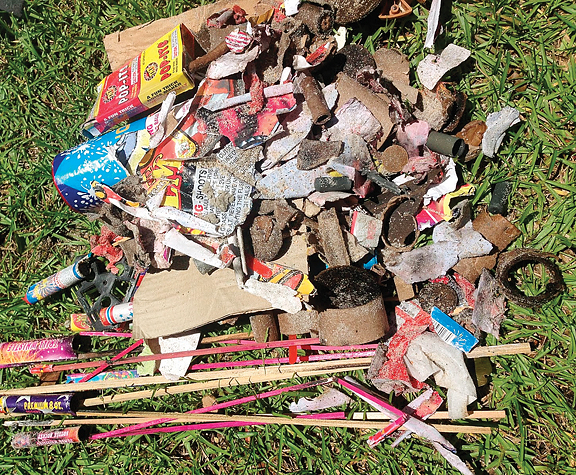Following July 4 festivities, WB Keep It Clean volunteer Ginger Taylor picked up 162 bits of firework debris as well as a small pile of cigarette butts, food wrappers, plastic straws and other pieces of litter off a three-quarter-mile stretch of Wrightsville Beach. Meanwhile, Masonboro.org volunteers stuffed four industrial-size dumpsters with garbage collected off Masonboro Island July 4.
Considering the sheer number of people who celebrated the holiday on the beach strand — as many as 25,000 between Mason Inlet, Wrightsville and Masonboro Island — those statistics likely represent a worst-case scenario for litter on the local beaches. But it’s not an issue limited to holiday weekends, Taylor said, and she hopes educating beachgoers can mitigate it.
Taylor and other Wrightsville Beach Sea Turtle Project volunteers regularly gather pieces of litter off the beach during their morning patrols for turtle nests, she said. She keeps a tally of items collected, which she sends to the Ocean Conservancy at the end of the year and they in turn send back an end-of-year report with trash totals.
Group members started keeping track of the trash they collected in 2009 and the Keep It Clean website indicates they have gathered an average of 550 bags of trash a year. But Taylor pointed out those numbers don’t tell the whole story, because so many people, whether affiliated with Keep It Clean or not, don’t keep track of the trash they pick up off the beach.
Litter is a universal issue at public beaches, she said, and Wrightsville Beach is no more polluted than the others — in fact, she said, it’s cleaner than many. But she said the currents near shore pull items out to sea rather than washing them back in, so the high tide can move trash from the beach strand into the marine ecosystem.
“If I walk the beach and it’s a clean beach at low tide, that doesn’t mean it was really a clean beach,” she said.
Taylor said microplastics, which can result from larger plastics breaking down, are sometimes ingested by tiny marine animals and passed up through the food chain.
“What we’re finding now …is we have plastic in plankton,” she said, “so there are larger fish, and they’ve already ingested plastic even if they didn’t eat it themselves.”
She told another story about a study done by a University of Florida student on 93 loggerhead hatchlings found dead. The student necropsied the hatchlings and found every one had ingested plastic, despite having been in the ocean for less than a month.
Taylor acknowledged a certain amount of littering is accidental, as empty cups or wrappers are lofted away from their owners by the sea breeze. But she said beachgoers can lessen their impact on the environment by making simple changes in what they choose to bring to the beach, like packing food or beverages in reusable containers instead of plastic.
“If everybody does one little thing,” she said, “It can help.”
email [email protected]




